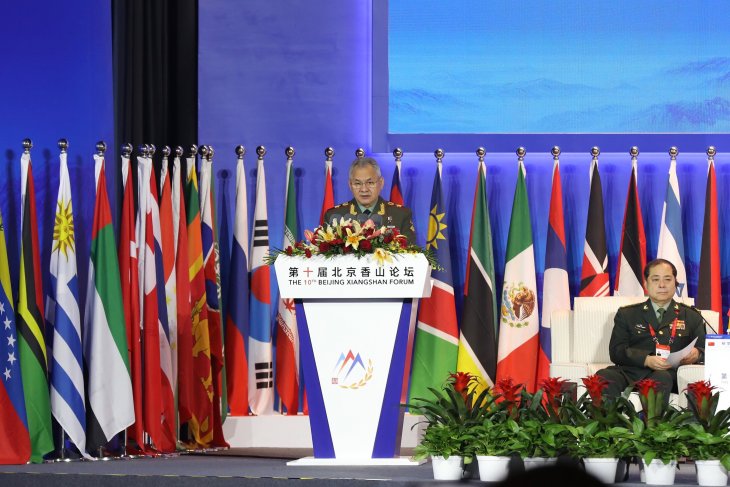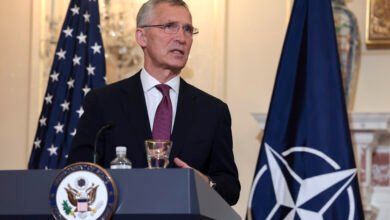The degradation of Russian morale in the trenches of Avdiivka and Bakhmut has driven Moscow to try altering the course of the war with a revival of nuclear blackmail tactics.

Russian Defense Minister Sergei Shoigu at Beijing Xiangshan Forum on October 30, 2023 in Beijing, China. Photo: VCG/VCG via Getty Images
On October 30, Russian Defense Minister Sergei Shoigu stated that Western attempts to inflict strategic defeat on Russia has increased the risk of a direct clash between nuclear powers (RIA Novosti, October 30).
Yet each time Russian leaders engage in nuclear brinksmanship, resolute international disapproval forces them to take a step back.
Unacceptable to China
Shoigu made these comments at the Xiangshan Forum in Beijing, perfectly aware that China considers such nuclear threats to be unacceptable.
On October 31, he moderated his statement, clarifying that no changes in Russia’s nuclear doctrine were under consideration in lowering the threshold for the use of nuclear weapons (Vedomosti, October 31). Sergei Karaganov, a commentator in Moscow, was more circumspect in addressing the tightly choreographed forum than he had been with the Valdai gathering three weeks prior (Nezavisimoe voennoe obozrenie, October 12). Rather than arguing for a preventative nuclear strike, Karaganov merely suggested upholding the current regime of nuclear deterrence (Kommersant, October 30).
Russian President Vladimir Putin refrained from any assertive statements after monitoring the regular exercises of Russian strategic forces five days prior to the Xiangshan Forum (Kremlin.ru, October 25). The scale of the exercises were limited, as none of Moscow’s much-advertised modern weapon systems took part. The old Tula (Delta-IV class) submarine, rather than one of the new Borei-class submarines, simulated launching missiles from the Barents Sea (Izvestiya, October 29). The RS-24 Yars intercontinental ballistic missile was launched from the Plesetsk Cosmodrome, while the long-promised RS-28 Sarmat is still stuck in production (see EDM, January 11). Overall, these tests were short and not entirely successful (Nezavisimaya gazeta, October 26).
New nuclear technology
Russia has been touting strong progress in developing new missile and nuclear technology over recent months. At the beginning of October, Putin announced a successful test of the nuclear-propelled Burevestnik 9M730 cruise missile.
No independent sources have provided confirmation of the launch, and the project remains technically dubious (The Insider, October 27). Putin has a penchant for bragging about “wonder-weapons.” This time, he praised the future prospects for Russia’s space programs. He visited the headquarters of space production company Energia in Korolyov and downplayed the failure of the Luna-25 mission to the Moon (see EDM, August 14; Kommersant, October 26).
Moscow’s claims of successfully modernizing its nuclear capabilities ring false as the domestic defense industry struggles to circumvent Western sanctions and solve personnel shortages (see EDM, January 11). Design bureaus within the Russian defense-industrial complex are reconfiguring old Soviet technology, as sanctions have severely curtailed access to the critical parts needed for more modern tech. Technical setbacks are blamed on scientists, who are harshly punished for high treason, while corruption is generally accepted as a normal business practice (Novayagazeta.eu, October 31).
Ambivalence in Russia’s nuclear diplomacy
The Kremlin’s hesitancy in brandishing nuclear instruments underpins the ambivalence in Russia’s nuclear diplomacy. This was evident last month during discussion on revoking the ratification of the Comprehensive Nuclear-Test-Ban Treaty (CTBT) (Rossiiskaya gazeta, November 2; see EDM, October 13; Carnegie Politika, October 20). Russian commentators have emphasized the significance of this unprecedented move while denying intentions to resume the testing of nuclear capabilities in the immediate future (Topwar.ru, November 2). Kremlin propaganda has rationalized the decision by arguing that it would give Russia the same status as the United States, which has never ratified the CTBT. Others in Moscow allege that Washington is preparing to stage nuclear tests, to which Russia would be force to respond in kind (Izvestiya, October 20; see EDM, October 24).
Only a few sober voices in Moscow dare to suggest that canceling CTBT ratification will have grave implications for Russia’s international standing. With this move, the Kremlin ceded the legal and moral grounds to present itself as a staunch supporter of nuclear non-proliferation (Publico.ru, October 17). Karaganov and others’ nuclear extremism have few followers. Still, the proposition that nuclear arms control is incompatible with carrying out the “special military operation” is broadly accepted as a political reality (Moskovsky komsomolets, October 9). The Russian Foreign Ministry has portrayed Washington’s persistence to resume consultations on strategic tests as disinformation aimed to hide efforts to erode Russian resolve in countering Western pressure (Kommersant, November 3).
China’s engagement with the US
Perhaps more surprising for Moscow was the news about China’s agreement to engage in talks with the United States on nuclear matters. This does not amount to arms control negotiations, but it does open up official channels of communication (Nezavisimaya gazeta, November 2). The Russian leadership finds it easy to concur with China in condemning US hegemony, and Shoigu greatly elaborated on this issue at the Xiangshan Forum (EurAsia Daily, October 30). The Russian official, however, did not account for the forum’s theme: “Common Security, Lasting Peace.” This fundamental Chinese interest in preserving global stability is typically misunderstood in Moscow (Russian International Affairs Council, November 2).
Beijing may not be thrilled with the expansion of military connections between Moscow and Pyongyang. North Korea’s delivery of artillery shells to Russia in exchange for missile and possibly nuclear technologies could escalate tensions on the Korean Peninsula beyond China’s control (see EDM, November 3). No less worrisome are the clandestine military ties between Russia and Iran, which may grant a new impetus for Tehran’s nuclear program (Svoboda, October 30). Iran is escalating the war in Gaza, and Russia finds it opportune to continue its dialogue with Hamas.
Russian nuclear posturing has failed to deter the West from supplying Ukraine with modern weapon systems. Neither has it prevented Ukraine from delivering long-distance strikes on military targets at the Novorossiysk naval base and Pskov airfield (see EDM, August 18, September 25). Beijing’s warnings have effectively limited Moscow’s nuclear rhetoric. The worries regarding the reported deployment of Russian tactical nuclear weapons on Belarusian territory seem to have subsided (see EDM, April 4, May 23).
Currently, the main threat emanates from Russia’s connections with North Korea and Iran, which are eager to supply old artillery shells and low-tech drones for advanced technological know-how in return. Deterrence prevails over nuclear blackmail for the moment, but this interplay remains fluid. New escapades from Moscow would require a new set of collective countermeasures in the West.
Source link




